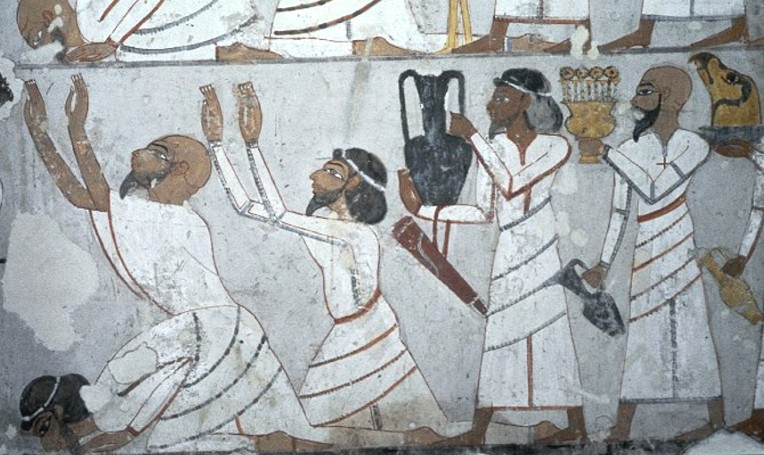Spiritual Vision-
Akhenaten may have been the first monotheist.
We have his own words, carved in stone. The young pharaoh reports having been divinely guided to the exact place the Creator had manifested himself at the beginning of the world. It was a plain near the Nile, bounded by hills except on the east, a great amphitheater facing the morning sun.
Akhenaten’s vision was not of many gods, but of one god—a god, with no female consort, who created himself anew each day.
He was called the Aten, or Father Aten, and symbolized by the solar disk. “Thou didst fashion the earth according to thy desire when thou wast alone … thou appointest every man to his place and satisfiest his needs. Everyone receives his sustenance and his days are numbered.”
The Aten is the source of life itself.
“Thou it is who causest women to conceive and makest seed into man, who gives life to the child in the womb of its mother, who comfortest him so that he cries not therein, nurse that thou art, even in the womb, who givest breath to quicken all that he hath made.” The god created the great life-giving Nile for Egypt, but he is a universal god who has placed “a Nile in heaven,” the source of rain, as a “gift to foreigners and to beasts of their lands.”
The Aten was symbolized by a figure of the sun with rays reaching out in all directions.
At the end of each ray is an open hand reaching out in loving kindness, as if to touch with life, and to give and to receive gifts. “Thou art remote yet thy rays are upon the earth,” writes Akhenaten. “Thou are in the sight of men, yet thy ways are not known.” The Aten can also be very near, at least to his spokesperson. “Thou art in my heart.”
It was a breathtaking vision and it shook Egypt from its moorings.
The other gods, he proclaimed, were not gods but idols. Upon his orders, their images were destroyed. In their place was put the austere hieroglyph for the Aten, increasingly understood not as the sun or even the sun-god, but as a distant and unrecognizable divinity.
This was gross impiety to most Egyptians, an insult to the gods.
Akhenaten’s “monotheistic zeal offended their reverence for the phenomena [through which the gods made themselves present] and the tolerant wisdom with which they had done justice to the many-sidedness of reality,” explains Henri Frankfort.
The result was perhaps predictable.
Upon the pharaoh’s death, priests and people alike turned against this strange and remote monotheism. The old statues, temples, and forms of worship were restored. Ahkenaten’s vision was a stunning venture in spiritual understanding but, in the end, came to nothing.
“Lord, what is the meaning of Akhenaten?”
Akhenaten was an extraordinary recipient of My inspiration (and of My) presence.
He was, as all are, bound by his culture and the symbols he had available. But he got the main message—that, in a sense, I am One, that I am not to be equated with the sun or any other natural phenomena, that other gods are lesser or “mere” manifestations of Me or, in a sense, non-existent compared to Me. The problem he ran into is that he was alone in his receptivity. Others were not prepared, were not open. The most spiritual Egyptians of his era were attuned to the old religion and could not jump the traces. It would have seemed impious to them.
“What was the difference between them and the people of Israel?”
The people of Israel were a people.
They—the mass of them—had an intuitive understanding of a Covenant. Remember that the mass of ancient Jews were not faithful, or (they were) faithful only periodically. But they all lived under the Covenant and understood that they so lived. Akhenaten tried to impose a spiritual vision from above, through imperial authority and example. Even his wife did not understand the vision; she followed it out of her great love for her husband.
________
Listen to this on God: An Autobiography, The Podcast– the dramatic adaptation and continuing discussion of the book God: An Autobiography, As Told To A Philosopher by Jerry L. Martin.
He was a lifelong agnostic, but one day he had an occasion to pray. To his vast surprise, God answered- in words. Being a philosopher, he had a lot of questions, and God had a lot to tell him.









